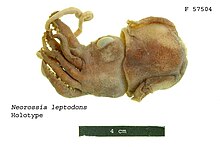Neorossia leptodons is a species of bobtail squid native to the southwestern Pacific Ocean, from New South Wales (32°08′S 153°07′E / 32.133°S 153.117°E) to South Australia (33°58′S 131°22′E / 33.967°S 131.367°E). It lives at depths from 130 to 1,110 m.[3][4]
| Neorossia leptodons | |
|---|---|

| |
| An image of a Neorossia leptodons taken in South Australia | |
| Scientific classification | |
| Domain: | Eukaryota |
| Kingdom: | Animalia |
| Phylum: | Mollusca |
| Class: | Cephalopoda |
| Order: | Sepiolida |
| Family: | Sepiolidae |
| Subfamily: | Rossiinae |
| Genus: | Neorossia |
| Species: | N. leptodons
|
| Binomial name | |
| Neorossia leptodons | |
N. leptodons exhibits sexual dimorphism. Females grow to 77.5 mm in mantle length (ML), while males are not known to exceed 42 mm ML.[4]
The type specimen was collected in the Great Australian Bight, South Australia (37°18.81′S 138°36.3′E / 37.31350°S 138.6050°E to 37°17.76′S 138°35.01′E / 37.29600°S 138.58350°E). It is deposited at the Museum of Victoria in Melbourne.[5]
References
edit- ^ Barratt, I.; Allcock, L. (2012). "Neorossia leptodons". IUCN Red List of Threatened Species. 2012: e.T162519A908078. doi:10.2305/IUCN.UK.2012-1.RLTS.T162519A908078.en. Retrieved 19 November 2021.
- ^ Julian Finn (2016). "Neorossia leptodons Reid, 1992". World Register of Marine Species. Flanders Marine Institute. Retrieved 10 February 2018.
- ^ Reid, A. 1991. Taxonomic review of the Australian Rossiinae (Cephalopoda: Sepiolidae), with a description of a new species, Neorossia leptodons, and redescription of N. caroli (Joubin, 1902). Bulletin of Marine Science 49(3): 748-831.
- ^ a b Reid, A. & P. Jereb 2005. Family Sepiolidae. In: P. Jereb & C.F.E. Roper, eds. Cephalopods of the world. An annotated and illustrated catalogue of species known to date. Volume 1. Chambered nautiluses and sepioids (Nautilidae, Sepiidae, Sepiolidae, Sepiadariidae, Idiosepiidae and Spirulidae). FAO Species Catalogue for Fishery Purposes. No. 4, Vol. 1. Rome, FAO. pp. 153–203.
- ^ Current Classification of Recent Cephalopoda
External links
edit- "CephBase: Neorossia leptodons". Archived from the original on 2005-08-17.
